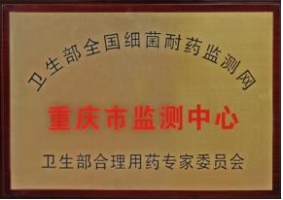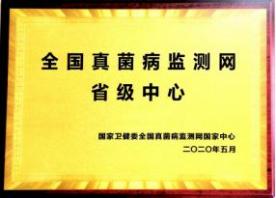The Department of Laboratory Medicine at The First Affiliated Hospital of Chongqing Medical University was established in 1957 following the relocation of the Affiliated Hospital of former Shanghai First Medical College (now Fudan University) to Chongqing. Through the dedicated efforts of multiple generations, the department has evolved into a comprehensive clinical diagnostic laboratory integrating medical services, education, and research. It currently houses sub-specialized laboratories in clinical chemistry, clinical immunology, clinical hematology and body fluid section, clinical microbiology, clinical molecular biology, and emergency laboratory testing. The department operates across several sites - including Yuanjiagang, Jingwei, Jinshan Campuses, and Qinggang Elderly Care Center - with a total operational area exceeding 6,000 square meters.
 Fig.: Group Photo of All Department Members
Fig.: Group Photo of All Department Members
The Department of Laboratory Medicine is recognized as a national key discipline in clinical laboratory diagnostics. It was among the first clinical key specialty construction units in the country and now serves as a national base for the standardized training of clinical laboratory residents. Additionally, it is designated as the National Bacterial Resistance Surveillance Practice Training Base, the Chongqing Monitoring Center of the National Bacterial Resistance Surveillance Network, the Provincial Center (Chongqing) of the National Fungal Disease Surveillance Network, and the Chongqing Medical Laboratory Quality Control Center. Notably, it is also first medical laboratory in Chongqing to receive both ISO 15189 accreditation and CAP certification.

 |
 |
In 1999, it was awarded the “National Youth Civilization Unit” title by the Central Committee of the Communist Youth League. In 2010, it became one of the first institutions awarded the National Clinical Key Specialty Construction Unit designation and was honored with the titles “Chongqing City Women’s Civilization Post” and “Chongqing City Outstanding Youth Group”. The department received the “National Youth Civilization Unit” award again in 2012, and was honored with the “National Women’s Civilization Post” award in 2017. Moreover, between 2016 and 2021, it repeatedly earned the dual accolades of “Outstanding Provincial Drug Resistance Monitoring Center” and “Excellent Practice Training Base”. From 2020 to 2022, it was continuously recognized as the Outstanding Quality Control Center in Chongqing.
II. Medical Work
(I) Comprehensive Sub-specialties and Advanced Facilities with Extensive Service Capabilities
The department offers a full array of sub-specialties and boasts outstanding capabilities in diagnosing and monitoring complicate and critical diseases. With over 500 testing items currently available, it has become one of the most advanced and comprehensive clinical laboratories in Western China, characterized by state-of-the-art equipment, robust technical expertise, a complete range of testing services, and extensive outreach capabilities. Based on second-generation sequencing technology, the department has established Chongqing’s first fully localized pathogen metagenomic sequencing platform. Utilizing a MALDI-TOF MS platform, it founded Chongqing’s Center for the Isolation and Identification of Rare and Difficult Pathogens, providing robust support for the diagnosis of severe, complex, and rare infectious diseases. In the realm of thrombosis and hemorrhagic disease diagnostics, the department offers the widest range of testing projects nationwide, delivering compelling laboratory evidence for coagulopathy-related diseases. It also possesses a comprehensive molecular biology technology platform that includes gene amplification techniques, flow cytometry, chip technology, an LC-MS (Liquid Chromatography-mass Spectrometry) system, and gene sequencing.
Clinical Microbiology Testing Platform 
Thrombosis and Hemostasis Testing Platform
 Molecular Biology Technology Platform
Molecular Biology Technology Platform
 (II) Well-structured Workforce with Strong Talent Pool
(II) Well-structured Workforce with Strong Talent Pool
The department comprises 124 staff members, including 21 with doctoral degrees, 28 with master’s degrees, and 59 with bachelor’s degrees. It features 4 senior-level professionals, 22 associate senior professionals, and 35 intermediate professionals. Additionally, there are 3 doctoral supervisors and 16 master supervisors within the department. The team is bolstered by a cadre of outstanding young and mid-career professionals, including National-Level Youth Talents, Key Innovation Leaders recognized by the Ministry of Science and Technology, Principal Investigators of National Key R & D Projects, Leaders of Chongqing’s Chief Expert Studios, Awardees of the Chongqing Outstanding Youth Fund, Leaders of Outstanding Young Medical Teams in Chongqing, Top Talents under Chongqing’s Special Support Program, and Chongqing’s High-End Young and Mid-Aged Medical Talents.
III. Teaching Work
The department is affiliated with the Clinical Microbiology Teaching and Research Section at School of Medical Laboratory Science at Chongqing Medical University. It takes a leading role in teaching the undergraduate course Clinical Microbiology Laboratory Techniques and core graduate courses, while also participating in the instruction of Clinical Immunology Techniques and Medical Laboratory Management at the undergraduate level. The department has contributed to the compilation of the national standardized undergraduate textbooks, including Clinical Microbiology Laboratory Techniques and National Clinical Laboratory Operation Guidelines - with one editor-in-chief, one associate editor, and eight contributing authors. Additionally, faculty members are also involved in both the theoretical and practical components of the Clinical Skills course at the First Clinical College, as well as in the pre-job training of standardized trainees and specialized nursing training for clinical departments such as Neurology, Respiratory Medicine, and Critical Care Medicine.
IV. Scientific Research
In recent years, the Department of Laboratory Medicine at The First Affiliated Hospital of Chongqing Medical University has been approved for one key project under the National Key R&D Program focusing on “Diagnostic Equipment and Biomedical Materials” and has secured 14 projects under the National Natural Science Foundation. The department’s research team has published over 130 SCI-indexed papers, including 11 papers with impact factors above 10. Furthermore, the department has received two provincial and ministerial-level science and technology achievement awards and holds 9 authorized national invention patents.
V. Quality Control Center Activities and Social Public Services
Leveraging the capabilities of the Chongqing Medical Laboratory Quality Control Center, the Chongqing Bacterial Resistance Monitoring Network, and the Fungal Disease Monitoring Center, the department provides multi-dimensional quality supervision and technical guidance. This is achieved through dispatching technology to grassroots institutions and facilitating face-to-face expert consultations, and regularly organizing laboratory forums, microbiology salons, training sessions at the bacterial resistance monitoring practice base, clinical molecular biology technology workshops, online “Golden Microscope” morphology training, and hosting continuing education programs for medical laboratory professionals from various hospitals at all levels. Under the leadership of the National Health Commission, the department launched the Test Result Mutual Recognition program in 2012. By establishing an organizational framework and robust quality supervision mechanisms - including on-site inspections, blood sample comparisons, and personnel training - the department has steadily promoted mutual recognition of test results across multiple tiers. This initiative has supported the establishment of quality control centers in 40 districts and counties, forming a hierarchical management system that has enabled full mutual recognition of 26 testing projects across 65 medical institutions. In collaboration with the Sichuan Medical Quality Control Center, the department also established the “Sichuan-Chongqing Test Result Mutual Recognition Expert Group”, which has successfully standardized cross-quality control procedures and achieved mutual recognition of 45 testing projects among tertiary Grade A public hospitals in both Sichuan and Chongqing.
VI. Information Technology Development
Relying on a comprehensive laboratory management system, the department’s Laboratory Information System (LIS) is fully functional, covering all stages of testing - from sample collection and reception to quality control, automatic report reviews and release, and data analysis.
The LIS facilitates digital management of documents, materials, equipment, and personnel, significantly enhancing operational efficiency. This system allows for precise, comprehensive, and refined management of laboratory processes, ensuring streamlined and accurate oversight.




